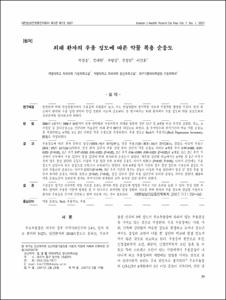KUMEL Repository
1. Journal Papers (연구논문)
1. School of Medicine (의과대학)
Dept. of Family Medicine (가정의학)
외래 환자의 우울 정도에 따른 약물 복용 순응도
- Keimyung Author(s)
- Kim, Dae Hyun; Suh, Young Sung; Kim, Jung Bum
- Journal Title
- 대한임상건강증진학회지
- Issued Date
- 2007
- Volume
- 7
- Issue
- 1
- Keyword
- Drug compliance; Depression; BDI(Beck Depression Inventory); 약물 순응도; 우울; Beck 우울척도
- Abstract
- Background It has been known that the prevalence of depression is increasing and depression may affect the compliance to medical
treatment. The purpose of this study was to evaluate drug compliance according to severity of depressive symptoms in
outpatient clinic.
Methods We surveyed 90 medical outpatients and evaluated the severity of depressive symptoms by Beck Depression
Inventory(BDI) score that was divided into normal, the level of normal (0~9). mild(10~18), more than moderate level(≥
19). The BDI is a self-administered scale with 21 items measuring depression. We compared drug compliance of medical
patients We compared drug compliance of patients with normal level of depressive symptoms(normal group) to those
with more than mild level(depressive group).
Results The prevalence of patients with the mild level of depressive symptoms was 41% and that with more than moderate level
of those 16%. There were significant relationships between BDI score and the degree of drug compliance at any follow
up period(Pearson coefficient of correlation -0.28(6 months), -0.44(1 year), -0.472(2 years). The depressive group had
significantly lower drug compliance than normal group at 6-months(P〈0.01), 1-year(P=0.02) and 2-years(P=0.02) follow-up
period. There were significantly greater differences between more severe depressive group and normal group at any
follow period(6 months, P=0.02; 1 year, P< 0.01; 2 year, P< 0.01).
Conclusions Depression was related with drug compliance of medically ill patients. Depression is needed to be evaluated and treated
to improve drug compliance in mdeically ill patients.
요 약 -
연구배경 일반인에 비해 만성질환자에서 우울증의 유병률이 높고, 이는 만성질환의 장기적인 치료에 부정적인 영향을 미친다. 일차 의
료에서 환자의 우울 성향 파악이 만성 질환의 치료에 중요하다. 본 연구에서는 외래 환자에서 우울 정도와 약물 순응도와의
상관관계를 알아보고자 하였다.
방 법 2006년 4월부터 2006년 10월까지 일개 대학병원 가정의학과 외래를 방문한 성인 남녀 중, 6개월 이상 추적된 고혈압, 당뇨, 고
지혈증 및 골다공증으로 진단되어 치료중인 외래 환자 90명을 대상으로 하였다. 총 투약일수와 추적기간의 비로 약물 순응도
를 측정하였고, 6개월, 1년, 2년 단위로 약물 순응도를 측정하였다. 우울 정도는 Beck의 우울척도(Beck Depression Inventory,
BDI)로 측정하였다.
결 과 우울정도에 따른 환자 분류상 정상군(BDI≤9)은 53명(59%), 경증 우울군(10≤BDI≤18)은 23명(26%), 중등도 이상의 우울군
(BDI≥19)은 14명(16%)이었다. 정상 환자 집단과 우울 성향 환자 집단의 약물 순응도 차이는 6개월 추적 0.99±0.008, 0.89±
0.025 (P<0.01), 1년 추적 0.97±0.010, 0.91±0.023 (P=0.02), 2년 추적 0.96±0.009, 0.90±0.023 (P=0.02)로 6개월, 1년, 2년 추적 기
간에서 모두에서 우울 집단이 정상 집단에 비해 유의하게 순응도가 낮았다. 세분화 집단별 비교에서는 6개월 및 1년 추적기
간의 경우 정상 집단과 중등도 이상의 우울 집단 간의 유의한 순응도 차이가 있었고 (P=0.02, P<0.01), 나머지 군간에는 우울
정도가 심할수록 낮은 순응도를 보였으나 유의하지는 않았다. 특히 6개월 평가 기간의 경우 경한 정도의 우울군과 중등도 이
상의 우울군의 순응도는 차이가 없었다(P=0.99). 2년 추적 기간의 경우는 중등도 이상의 우울 집단에서 정상 및 경한 우울 집
단과 유의한 순응도 차이를 보였고 (P<0.01, P=0.01), 정상 집단과 경한 우울 집단간의 유의한 순응도 차이는 없었다. BDI와
약물 순응도간의 상관관계 결과는 추적기간에 관계없이 모두 유의한 상관 관계가 있었다.
결 론 우울증은 장기간 규칙적인 약물 치료를 요하는 환자의 약물 순응도에 영향을 미치고 치료 효과를 늦출 수 있다. 만성 질환 자
체도 환자의 우울한 기분에 영향을 줄 수 있으므로 효과적인 만성 질환의 치료를 위해 환자의 우울 정도에 관심을 기울이고
환자의 우울증을 조기에 진단하고 함께 치료해 가는 것이 필요하다.
- Alternative Title
- Drug compliance according to severity of depressive symptoms in medically ill outpatients
- Publisher
- School of Medicine
- Citation
- 박정웅 et al. (2007). 외래 환자의 우울 정도에 따른 약물 복용 순응도. 대한임상건강증진학회지, 7(1), 39–44.
- Type
- Article
- ISSN
- 1598-1401
- Appears in Collections:
- 1. School of Medicine (의과대학) > Dept. of Family Medicine (가정의학)
1. School of Medicine (의과대학) > Dept. of Psychiatry (정신건강의학)
- 파일 목록
-
-
Download
 oak-bbb-3376.pdf
기타 데이터 / 281.88 kB / Adobe PDF
oak-bbb-3376.pdf
기타 데이터 / 281.88 kB / Adobe PDF
-
Items in Repository are protected by copyright, with all rights reserved, unless otherwise indicated.